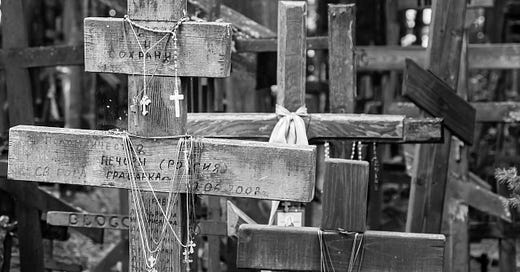In recent years, a curious trend has emerged primarily among young men who say they are disillusioned with modern evangelicalism. Interestingly, it’s a mass exodus from evangelicalism toward Eastern Orthodoxy. Drawn by its ancient traditions, focus on liturgy, and the allure of order in an increasingly disorderly world, many see Orthodoxy as a refuge from the emotionalism and perceived shallowness of contemporary church culture.
For many, it’s a longing for something tangible, something rooted in history, something that feels sturdy in the face of relentless societal upheaval. But beneath the golden icons and incense-laden sanctuaries lies a troubling reality, a gospel obscured by works, rituals, and tradition. And while the appeal of Orthodoxy may seem compelling on the surface, it demands a critical examination—one that Trevin Wax’s Gospel Coalition article utterly fails to provide.
Trevin Wax’s recent article on The Gospel Coalition (TGC), “Is Eastern Orthodoxy the Next Big Thing for Young Men?” subtly endorses Eastern Orthodoxy as a valid expression of Christianity. As with most TGC articles, it reads like a carefully packaged mirage, polished on the outside, but utterly devoid of substance where it matters most.
The problem is not merely that Wax tiptoes around the theological deficiencies of Eastern Orthodoxy. It’s that he fails altogether to engage with the root of the matter, the gospel itself. And without the gospel, what are we even talking about? A version of “Christianity” that doesn’t proclaim the biblical gospel is not Christianity at all—it's an empty husk counterfeiting the Church.
Eastern Orthodoxy, for all its aesthetic appeal—its golden icons, its incense-filled liturgies, its aura of mysticism—is fundamentally inadequate. It has traded the simplicity and sufficiency of Christ’s finished work on the cross for a labyrinth of works-based righteousness and sacramental superstition.
And yet, Wax seems content to present it as just another option for spiritually restless young men as though we can simply pick a religious expression like shopping for furniture.
Tired of modern trends? Despise the professional production of modern megachurches? Why not try Orthodoxy? Don’t get me wrong, I hate all that stuff too. But is the gospel even a factor in his analysis? Or has that become an afterthought in this postmodern buffet of Christian flavors?
I can understand the appeal of Eastern Orthodoxy for those desperately seeking an experience not rooted in the cultural zeitgeist. I’ve seen it firsthand. Several years ago, I visited the Greek Orthodox church where Hank Hanegraaf was chrismated. Walking into that building, I was struck by the artistry and solemnity of the surroundings—the rich iconography, the reverence for tradition, the ancient rituals that seem to transport you to another time. For those disillusioned with the shallow, emotionally driven practices of modern evangelicalism, it’s easy to see why such an environment would feel like a refuge.
But for those who are in Christ, He alone is enough.
The gospel is not found in the chanting of priests or the burning of incense any more than it’s found in the fog machines, concert lighting, and emotionalized lyrics of Bethel or Hillsong music.





